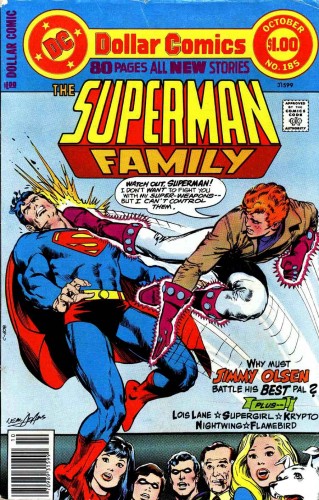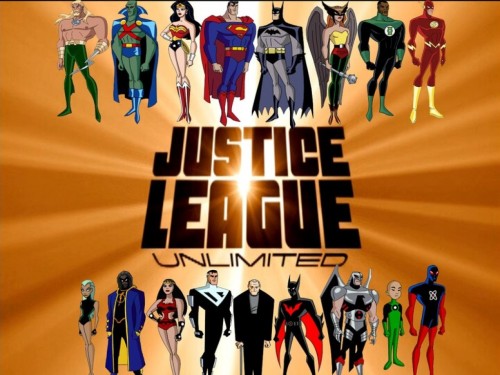
This soon-to-be-classic series on the Justice League from Wenatchee the Hatchet looks at moral/religious themes from Superman, Wonder Woman, and the rest from the Cartoon Network series. In this installment, we look at the temptation of hopes and dreams through Superman’s character. For more on Supes, go here.
Saving the World from Better Worlds
Superman fights for truth, justice and the American way. Superman saves the world. He saves Earth from alien invaders who would destroy or subjugate it as well as from those who call it home and would refashion it in their own images. But as the animated series Justice League (Unlimited) demonstrates, Superman discovers his battle is not just against Lex Luthor, Brainiac, and Darkseid. The last son of Krypton must also fight to save the world from even his own hopes and dreams and their unforeseen effects.
This irony is built into the pilot of the series. We’re shown that Superman, eager to regain the trust of humanity after having been a pawn of Darkseid, sets out to rid the world of nuclear weapons to promote world peace. Superman IV, anyone? Superman successfully disarms the world’s nuclear weapons stockpile only to discover those weapons were all that held an invading army of white Martians at bay. Superman’s success in a quest for peace unwittingly opened the way to interplanetary war.
In order to defeat the invading white Martian hordes, Superman enlists the aid of Batman, Wonder Woman, Green Lantern, Hawkgirl, the Flash and J’onn Jones, the Martian Manhunter. Without J’onn Jones, the last living native of Mars, even the newly minted Justice League can’t defeat the invasion. But as a team, of course, the League prevails. Over the years Superman forges friendships with his fellow heroes in the battle against criminals and warlords and conquerors. But these friendships are sometimes tested by Superman’s power and preference to do everything himself. What he sees as the way to keep more people safe, teammates like the Flash and Green Lantern begin to see as a superiority complex. Over time even Batman begins to suspect his friend from Krypton may succumb to the temptation to become a despot.
And in the story “A Better World” an alternate universe Superman appears who is a despot, and a murderer to boot. Superman and the League end up locked in battle against despotic alternate dimension versions of themselves. In their universe of the Justice Lords, Superman has killed President Lex Luthor in retaliation for the death of the Flash. The Justice Lords come into the Justice League’s dimension to rid the Earth of crime, and Superman discovers that his alternate universe self has no remorse about killing. At length Batman points out that to defeat evil versions of themselves, Superman and the League will have to cross some kind of ethical or relational line the Justice Lords won’t cross. Superman chooses to work with Lex Luthor to defeat the Justice Lords, and Batman is able to convince his despotic doppelganger that a police state isn’t the kind of world Bruce Wayne’s parents would have wanted to live in.
The day is saved, but seeds of doubt about the unbreakability of Superman’s moral compass have been planted. Not even Batman can be entirely certain that our Man of Steel’s moral compass will always point to true north. A Superman who can’t doubt himself could easily become a tyrant. While Batman can say that Superman taught him that justice doesn’t always have to come from a place of darkness (“Hereafter”), when the Flash teases Superman about how he’s not such a Boy Scout after all, Superman can joke that he never even got his first merit badge. This Superman, as series creators have remarked, is a more battled-hardened, and even jaded, superhero.
As we’ve established at length, the best stories about Superman don’t merely challenge him physically or emotionally. A compelling story about the Man of Steel will challenge his moral compass. Can he make the right decisions when the line between good and evil begins to blur? Can he be counted on to not simply seize power and become the murderous tyrant his Justice Lord self became in another world? If the United States government has secret operatives who fear what Superman could do if he went rogue again, are these people automatically villains? These questions take up much of the revamped series Justice League Unlimited.
As enemies from his past come back for revenge, Superman discovers that his own fondest dreams can be used as weapons against him. Batman had to second-guess a perfect life in a battle against the Mad Hatter, Superman, famously, has to shake himself out of a dream life in “For the Man Who Has Everything”. In a fine adaptation of Alan Moore’s classic tale, “For the Man who has Everything”, Superman wakes up to a universe in a paradisiacal Krypton he eventually rejects as illusion. He breaks free from the sham fed to him by a parasitic plant called the Black Mercy that was placed on him by an old enemy, Mongul, who has come back for revenge. In order to save the real world from a bloodthirsty monster, the last son of Krypton has to destroy the life of his fondest dreams. So far, the Kansas farmboy’s moral compass is steady.
But Superman and the rest of the Justice League begin to hear rumors as they fight bad guys. Bitter retired generals and unstable new superheroes let slip rumors of a Project Cadmus. Superman begins to discover that friends have turned into enemies and that not everyone who appears to be an enemy is really an enemy. With Luthor running for president and generals in the Army unveiling a variety of super-soldiers created to defeat him, Superman begins to be more suspicious, paranoid, and cynical about nearly everything and everyone but himself. As Batman, Green Arrow and Question pummel Superman with open doubts about how sure his moral compass really is, Superman begins to burn with resentment that his character is being questioned without realizing that he’s being played by enemies hiding in plain sight.
But by that point Superman is becoming paranoid, even to the point of getting into a brawl with Captain Marvel in Lexor City because he’s sure Luthor’s up to something. He has also banished Doomsday to the Phantom Zone and authorized firing a fusion cannon to stop alien robots. While he’s certain he’s made the right calls, he’s jaded to how real the terror he’s begun to inspire is. It’s not just bad criminals who fear him, but normal citizens too.
Superman begins to lose sight of the fact that his sternest critics have begun to be his own friends and allies. Or, with his old friend Professor Hamilton, a friend has become an enemy since Superman conquered Earth for Darkseid. The more his friends question his judgment and the increasing swiftness and violence of his tactics to stop Cadmus, the more defensive Superman becomes. Superman also doesn’t realize that Batman has been privately contacting members of Cadmus to discern their real motives and discovers that not everyone in Cadmus is evil.
As Green Arrow and the Question begin to confront Superman about his brawling and the risks of Lex Luthor becoming President, Batman begins to discover that Superman’s old nemesis, Lex Luthor, has been gaming everyone in a bid to give himself superpowers. But Luthor himself turns out to be a pawn in the hands of a long-dormant Brainiac. Batman, merely mortal, has found out what the real threat is but is powerless to do anything about it. As Superman and the League finally take on a new fusion of Lex Luthor and Brainiac, you would think that Superman could finally defeat both the worst Earth has to offer and the worst Krypton has to offer, to defeat the most malignant legacies of the two worlds he can call home. But in the end, paradoxically, Superman doesn’t. He can’t and won’t kill Luthor and he can’t kill Brainiac. Luthor/Brainiac ends up being defeated by the cut-up and clown of the Justice League, the Flash.
Superman, chastened by the realization of how close he came to being a despot, issues a public apology to the world:
This is the hardest thing I’ve ever had to say, I’m guilty. We’re guilty of the sin of hubris. We had the best of intentions, to be Earth’s guardians, to keep you safe, but we failed you. We looked down on the world from our tower in the sky and let our power and responsibilities separate us from the very people we were supposed to protect.
Of course Superman goes on to fight evil and to defend truth, justice and the American way, but he continues to do so because he’s able and willing to confess that his moral compass can break.
[youtube=http://www.youtube.com/watch?feature=player_detailpage&v=Lpv3_Spc3ms&w=600]

COMMENTS
One response to “Justice Has Its Price: The Exiles and Orphans of the Justice League, pt. 1”
Leave a Reply
















Ever hear about the recent video game “Gods Among Us”? It’s a take on Superman’s despotic tendency, to make tyranny for the good of others. Sort of like the Dostoevsky’s Inquisitor. Heavy stuff.